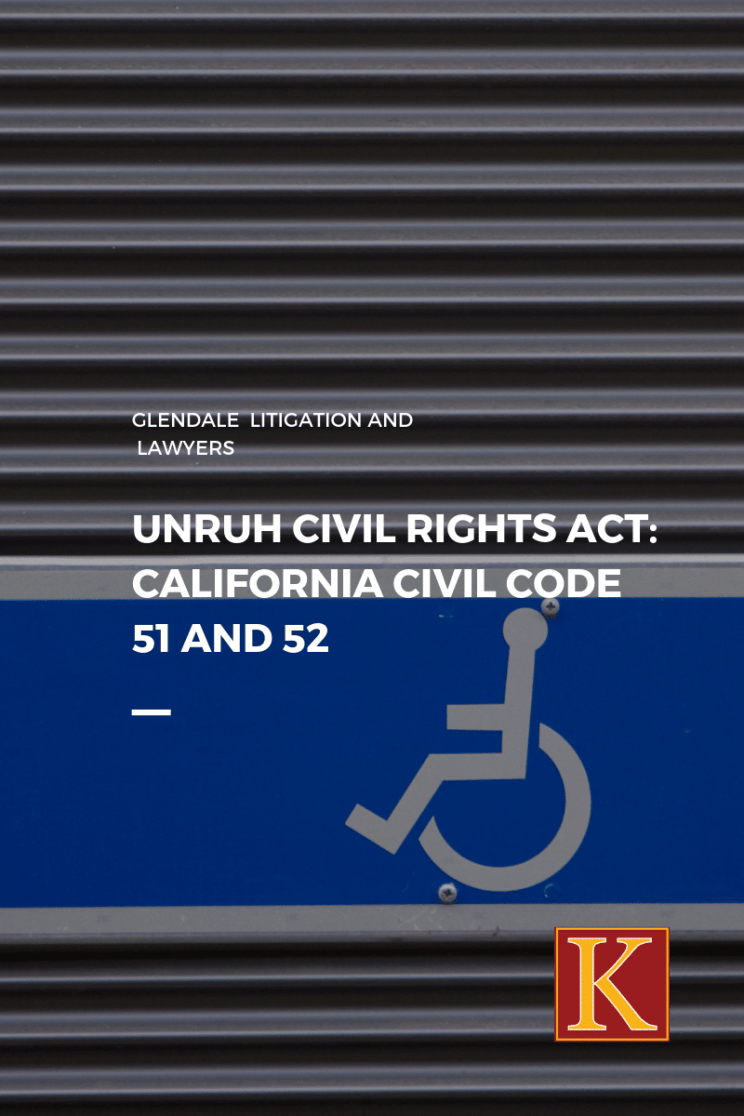The Unruh Civil Rights Act, California Civil Code Sections 51 and 52, provides protection from discrimination by all business establishments in California, including housing and public accommodations.
The Unruh Act was designed to protect people rights from arbitrary discrimination and to guarantee their rights to equal and full access to all public accommodations.
California Civil Code 51(b) and Equal Accommodations
California Civil Code Section 51(b) defines the regulations under the Unruh Civil Rights Act:
“All persons within the jurisdiction of this state are free and equal, and no matter what their sex, race, color, religion, ancestry, national origin, disability, medical condition, genetic information, marital status, or sexual orientation are entitled to the full and equal accommodations, advantages, facilities, privileges, or services in all business establishments of every kind whatsoever.”
Discrimination by a Business Establishment
While the Unruh Civil Rights Act specifically indicates discrimination based on “sex, race, religion, age, color, national origin, ancestry, medical condition, disability, marital status, genetic information or sexual orientation”, the California Supreme Court has held, that protections under the Act are not only necessarily limited to the mentioned characteristics.
The Unruh Act includes all intentional and arbitrary discrimination by a business establishment based on personal characteristics related to the above mentioned ones.
What Is Considered to Be a Business Establishment According the Unruh Act?
The list includes some examples of business establishments that are covered by the Act. The list is non-exhaustive, and can include any place of public accommodation:
- Retail Establishments
- Hotels and Motels
- Non-Profit Organizations that are a public accommodation or have a business purpose
- Restaurants and Bars
- Hospitals
- Barber and Beauty Shops
- Theaters
- Housing Accommodations
- Retail Establishments
- Golf Courses
- Public Agencies
- Retail Shops
- Fitness Clubs
California Department of Fair Employment and Housing (DFEH)
If you believe that a business establishment has violated the Unruh Act, you can file a complaint with the California Department of Fair Employment and Housing (DFEH).
DFEH is not an advocate for the complaining person or for the business establishment. Department of Fair Employment and Housing represents the State of California. If possible, DFEH will try to assist both parties in resolving the complaint. In case a voluntary settlement cannot be reached, and there is enough evidence of violation, DFEH can issue a civil complaint. Generally the complaint must be filed within one year of the violation. Though, in case the discrimination has connection with hate violence, a person has one year from the day he becomes aware of the committer’s identity to file the complaint, but not more three years from the date of the injury. If a individual wishes to file lawsuit directly through the courts he can do so without involving DFEH.
Remedies for Discrimination Violation Under Unruh Act
Possible remedies for violations of the Unruh Act can include:
- General and special damages
- Injunctive relief
- Cease and desist orders
- Out-of-pocket expenses
- Attorney’s fees.
- Damages for emotional distress
Court-ordered damages can include up to three times the total amount of the actual damages, also known as “treble damages”, but not less than $4,000 for each offense.
California Civil Rights Discrimination Attorney
If you believe that you have been discriminated against in housing or by a business, our employment law attorneys at KAASS LAW can evaluate your case understand your rights under the Unruh Act and other California anti-discrimination laws, and take your case to trial or secure a fair settlement.

